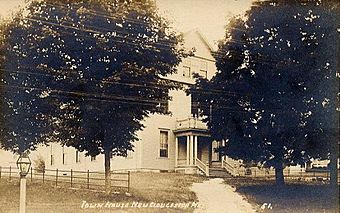New Gloucester Historic District facts for kids
Quick facts for kids |
|
|
New Gloucester Historic District
|
|

New Gloucester Town Hall, postcard view c. 1915
|
|
| Location | SR 231, Gloucester Hill Rd., and Cobbs Bridge Rd., New Gloucester, Maine |
|---|---|
| Area | 275 acres (111 ha) |
| Architectural style | Federal, Mixed (More Than 2 Styles From Different Periods) |
| NRHP reference No. | 74000162 |
| Added to NRHP | November 13, 1974 |
The New Gloucester Historic District is a special area in the heart of New Gloucester, Maine. It's like a time capsule, showing us what a small village looked like in the 1700s. This district is unique because it has many homes built in the late 18th century. It was officially added to the National Register of Historic Places in 1974, recognizing its importance.
Contents
Exploring the History of New Gloucester
The town of New Gloucester is located in northern Cumberland County. It's northwest of coastal towns like Freeport and Brunswick. The town was first given its official charter in 1735. People started settling here in 1742.
Early Challenges and Resettlement
Life was not always easy for the early settlers. In 1744, a conflict called King George's War began. Because of attacks from Native American groups, the settlers had to leave New Gloucester. They did not return until 1753.
First Homes and Town Growth
The very first wooden house in the village was built in 1761. It was built by Isaac Parsons and amazingly, it still stands today! New Gloucester officially became a town in 1794. It has always been a quiet farming community.
Discovering the Village Center
The center of New Gloucester is a spread-out village. It's mainly found where Maine State Route 231 meets Gloucester Hill Road and Cobbs Bridge Road. Route 231 was an important early road. It connected the village to Yarmouth back in 1756.
Historic Buildings and Architecture
Along these roads, you can see many old wooden houses. A lot of them were built before 1810. These homes show off beautiful Georgian or Federal styles of architecture. The district also includes a tavern from 1782. You can also find the town's first cemetery here.
Important Historical Sites
There's a spot where a blockhouse once stood. This was a small fort built after the town was resettled in 1753. Today, a smaller copy of the blockhouse marks the spot. Public buildings in the district were built later. The Greek Revival style Congregational Church was built in 1838. It stands where the town's first church used to be. The town hall, library, and first high school were all built around 1900.
 | Misty Copeland |
 | Raven Wilkinson |
 | Debra Austin |
 | Aesha Ash |



